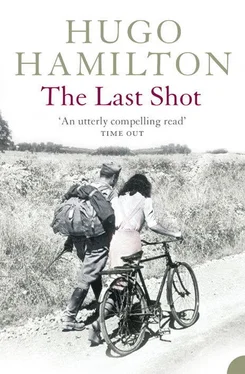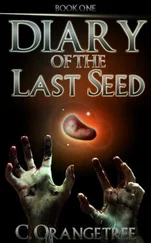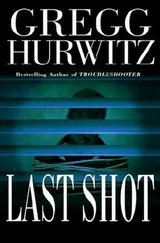‘Here, you can see for yourself. Nuremberg had eighty-five per cent bomb damage after the war. Here, there was nothing left standing. Not one house was left with its roof on.’
I glanced dutifully through the post-war black and white photographs of the city. It looked like a village, low walls with rubble. The spires of churches, the buildings I had already become familiar with from walking around the town, were ruins. It was remarkable. The opposite page showed the same buildings completely restored. I knew all this from other German cities, Frankfurt, Berlin, Cologne. But she wanted to tell her story.
‘This house had no roof and no floors. Only the stairs were left. We lived here under a canopy for three years. Everywhere, I had buckets collecting the rain. I restored this house with my own two hands.’
I looked around to admire her achievement. It was a fine house in the centre of the city. She owned the third and fourth floors, now worth at least 2 million DM, she estimated.
The TV in the corner was showing particularly explicit love scenes, which she ignored completely. She went on talking about the war. She must have thought it was odd to find somebody who was interested in listening to her.
‘If they want some of this economic miracle,’ she said, referring once more to the East Germans, ‘they’ll have to work for it like anyone else. You don’t get this Wohlstand for nothing.’
The TV was now showing the silhouette of a naked woman standing against a window. I have always wondered how older German people can be so impervious to nudity on the screen and nudity on the front of magazines at the newspaper kiosks. I decided to ask her about her husband.
‘He’s long dead,’ she replied. It looked as though she wanted to leave it at that.
‘I’m sorry to hear that,’ I said. ‘Where did that happen?’
‘I don’t know,’ she said. ‘He didn’t come back. He left this house to go to the Front in nineteen forty-four. I went to the country, to my aunts. I never heard from him. I came back here after the war but I knew he had fallen somewhere. I never heard anything, God bless him.’
She paused and thought back.
‘Sometimes people came to me saying they had seen him. I would invite them in and ask them where, when. I would give them food. Sometimes I gave them money. Or gifts. I was so overjoyed to hear that he was alive, maybe in some POW camp. Other men came and said the same thing. I believed them. My hopes were so high I gave them gifts of silver, anything I had. But then, when the months and the years went by, I realized they had conned me. They had all come just to get their food and gifts. He never came back.’
I began to think of Franz Kern’s wife. Perhaps she was left waiting for him after the war, waiting for days and weeks, slowly beginning to believe the agonizing truth that he wasn’t coming back. What if Franz Kern never returned to Nuremberg? I would have been searching aimlessly for him. Maybe I should be looking for him in America.
I returned to Düsseldorf.
I had failed to find Franz Kern. For weeks I was hoping to get some response from the adverts I had placed in the papers. Nothing.
Anke phoned me. She wanted to meet me. She had to meet me. In those weeks, she began to come down Düsseldorf on the train once a week, then twice a week. It doesn’t take long from Münster to Düsseldorf. She was back home again by 5 o’clock. We met at the station, we went for lunch. Sometimes we went back to my apartment.
After Christmas, she came down to Düsseldorf regularly, at least once a week. It wasn’t just love. She needed to talk to me. Sometimes we did nothing but talk together for hours. Occasionally, we decided to meet on neutral ground, in some other smaller town. Throughout January and February we met in towns like Geldern, Kevelaer and Xanten, where we visited the cathedral. We once went to Kempen, to satisfy my curiosity, and walked around the market square and around the old fountain.
Anke kept telling me how ill Alexander was. He still went to the special school every day. But sometimes she had to take him to hospital for tests. Endless tests. Jürgen was saying there was little hope. Leukaemia was not something they had found a successful treatment for. Sometimes Anke had to postpone our meeting. So we talked on the phone instead. Anke cried a lot. Every time we met she cried for Alexander.
I had already given up any hope of a response from my ads in the newspaper when I got a letter through the box number from the Frankfurter Allgemeine. I couldn’t believe it. I wanted to ring Anke and tell her. It was a letter on blue paper from a woman named Frau Marianne Jazinski. It didn’t say much, just gave the address and a short, hasty note.
‘I know the Franz Kern you are looking for.’
Franz Kern stood in the middle of the farmyard beside the dead dog. The dog’s leg was still twitching, so it seemed. Foam clung to his purple lips and to his teeth. The sun shone directly into the farmyard. A shallow rusted basin full of water reflected the sheen of the sun. Midges or flies hovered over it. This had probably been the dog’s drinking bowl, where he lapped the water with his long tongue. The rake with which the dog had been struck lay right beside him. Otherwise the farmyard was empty.
Kern felt helpless. He almost wished he was back in Laun. Again, the unforgiveable idea had entered his mind. What if he just got on his bike and left on his own? It was every man for himself. He could have left all this trouble behind. But the thought was too horrific to imagine. He had to force it out of his mind. There was no question of betraying her. Leaving her to the same fate as this dog. Bertha. He loved her.
He removed the small haversack from his back, took out the hand-gun and discarded the haversack beside one of the wooden farm buildings. He had never used the gun. Only three or four times at target practice. Never in combat. It felt strange in his hand. So easy to carry.
He had no idea where to run. He listened for a moment. He heard water. A stream somewhere. He thought once more of calling Bertha, even just to let her know he was with her. But he decided against it. He made a choice and ran around to the back of the outhouses where the forest began again; two chestnut trees, already in bloom, standing like a gateway into a deeper forest. Surely this is where Bertha ran to. He knew by intuition. There were banks of nettles everywhere else. It was the only way she could run, with bare legs.
In all the years of the war Franz Kern had seen no action. Not that he was looking for it. But he always had an irrational feeling that he was missing something; a phobia maybe that he would always arrive too late. It was a fear he had always had in school, during his tests, when he was asked to read out loud, when he was asked to write on the blackboard. He was afraid of being slow. It only began to disappear after he became a technician, or soon after he was conscripted into the army and discovered that others were slower, less enthusiastic than he was. He had always told himself to do his best. More talented people often did less well, and had less stamina.
Running through the chestnut trees into the cool shade of the forest, he told himself once more to do his best. He was a soldier. He was clever. He would find her.
Up to then, Franz Kern’s attitude towards the war had been predominantly escapist. He did at the beginning feel as though something good was happening in Germany, but that quickly faded when he became a radio technician and heard the reaction from outside Germany. All he wanted to do in life was to open a shop and fix radios. At the age of eight, he had put together his first radio, a crystal receiver. With a small earphone, he received his first signal like a message, like a vocation from above. He excelled at his trade, working in a radio repair shop in Nuremberg before he was drafted into the army.
Читать дальше
Конец ознакомительного отрывка
Купить книгу












